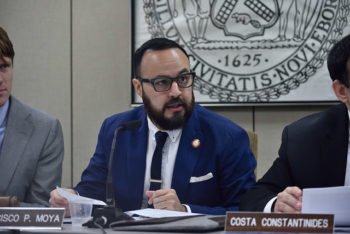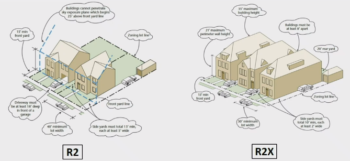
Chair Francisco Moya. Image Credit: New York City Council
The proposed rezoning will allow growing families in the community to remain in the neighborhood without compromising their desire for more housing space. On September 25, 2019, the City Council voted to approve the rezoning of two areas in Kew Gardens Hills, Queens. The areas are located northeast of the Kew Gardens Interchange generally bounded by 72nd Avenue to the north, Union Turnpike to the south, Main Street to the east, and Park Drive East to the west. The applicant proposed to rezone the areas to allow for larger homes to be built. The rezoning would give community homeowners the flexibility to expand their homes and ensure already expanded homes are under compliance.
The project area’s current zoning allows single-family homes to be constructed up to a maximum of 0.5 floor area ratio (FAR) and the height cannot exceed an inclined boundary that begins at a height of 25 feet. The current zoning also requires homes to be set back at its rear at a minimum of 30 feet from the street. The proposed rezoning would increase the FAR maximum to 0.85 or 1.02 with attic allowance and decrease the rear yard requirement set back to 20 feet. The proposed rezoning would also cap the maximum height at 35 feet. For CityLand’s prior coverage of the proposal, click here.

Building envelope comparison R2 to R2X. Image Credit: CPC.
On September 4, 2019, the Subcommittee held a public hearing for the application. The applicant’s attorney, Jay Goldstein, and two Queens Community Board 8 residents were panelists at the hearing. Council Member Rory Lancman opened with remarks of support for the proposal. He noted that the rezoning will accommodate growing families in his district and would provide incentives for them to stay in their communities.
Subcommittee Chair and Council Member Francisco Moya asked Goldstein to clarify the differences between the two zoning districts. Goldstein explained that the major difference is the minimum rear yard setback requirement. He explained that the current zoning district’s size requirements only allow for taller homes but not larger homes. Goldstein noted that under the rezoning, the rear yard setback requirement would allow for larger space and this would meet the community’s desire for larger rooms in their homes.
Council Member Moya also asked about the common expansions seen or anticipated in areas that have been similarly rezoned. Goldstein stated that it is anticipated that homes would only be enlarged at the rear yard but there may be some homes that may be expanded in all directions.
Goldstein explained that the applicants modeled their application on similarly zoned areas in Far Rockaway in Queens and areas of Brooklyn by Ocean Parkway. He said the areas have similar demographics as Kew Gardens Hills and the zonings have worked out well.
Council Member Lancman opened the floor to Adam Sokol and Jacob Shafran, the residents on the panel, to testify on the importance of the proposal for the community. Both Sokol and Shafran stated that the rezoning would allow them and their neighbors to be able to stay in the communities their families were raised in, instead of seeking larger, more affordable housing outside the City.
On September 18, 2019, the Council Subcommittee on Zoning and Franchises voted to approve the application and on September 23, 2019, the Council Committee on Land Use voted to approve the application.
On September 25, 2019, the City Council voted to approve the application at the stated meeting.
By: May Vutrapongvatana (May is the CityLaw Fellow and New York Law School Graduate, Class of 2019).

